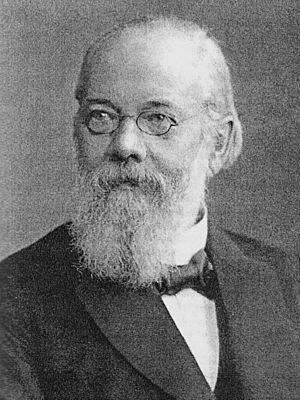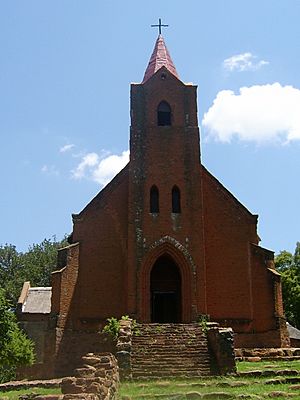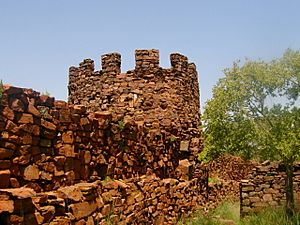Alexander Merensky facts for kids
Quick facts for kids
Alexander Merensky
|
|
|---|---|

Alexander Merensky
|
|
| Born | June 8, 1837 Panten
|
| Died | May 22, 1918 (aged 80) Berlin
|
| Nationality | German |
| Occupation | Missionary |
| Known for | Working in South Africa |
Alexander Merensky (born June 8, 1837, in Panten near Liegnitz; died May 22, 1918, in Berlin) was a German missionary. He worked in South Africa, specifically in a region called Transvaal, starting in 1859.
Contents
Alexander Merensky's Life Story
Early Life and Missionary Training
Alexander Merensky lost his parents when he was young and grew up with relatives. In 1855, he joined a special school for missionaries called the Berlin Missionary Society seminary. He finished his training and was sent out on November 23, 1858.
He traveled by sailboat from Amsterdam to Cape Town, then continued to Natal in South Africa. His travel companion was another missionary named Karl-Heinrich Theodor Grützner.
Starting Missions in South Africa
On August 14, 1860, Merensky and Grützner started their first mission station. It was called Gerlachshoop. This was the first mission station of the Berlin Missionary Society north of the Vaal River. Merensky officially became a missionary at Gerlachshoop on January 11, 1861.
They opened another mission station in August 1861. It was named Kgalatlou, also known as Schoonoord.
Family and Challenges
On October 15, 1863, Merensky married Marie Liers from Breslau. They had seven children together. One of their children was Hans Merensky, who later became famous.
The family lived in Kgalatlou until May 1864. With permission from Sekhukhune, the leader of the Bapedi people, they founded a new mission station. It was called Ga-Ratau and was about 15 kilometers from the Bapedi capital. This station officially opened in May 1864.
However, soon after, Christians in the area faced difficulties. Merensky and his family, along with their community, had to quickly leave Ga-Ratau on the night of November 23, 1864.
Founding Botshabelo
In January 1865, Merensky used his own money to buy a farm. It was in the Middelburg district of the Transvaal Republic. Here, with Missionary Grützner, he built a new mission station called Botshabelo. This name means "place of refuge" in the Northern Sotho language.
On a hill overlooking Botshabelo, a fort was built. Merensky named it "Fort Wilhelm" to honor the German emperor. Today, it is known as Fort Merensky. By 1869, they had built a blacksmith's shop, a workshop for wagons, and a mill. These places helped local villagers and community members learn useful skills.
Later Years and Return to Germany
In 1876, the British took control of the Transvaal Republic. Sir Wolseley, a British leader, even made Botshabelo his main base in the area.
During the First Anglo-Boer War, Merensky was asked to work as a military medic for the Boer forces. He was present at battles like Laing's Nek and Majuba Hill. He wrote about these battles from his field hospital, seeing them from a distance.
After the war ended, both the British and Boer authorities did not fully trust him. Because of this, Merensky decided to move back to Germany with his family. In 1883, he was promoted to Inspector of the Berlin Missionary Society.
Travels and Legacy
In 1890, Merensky traveled to the northern shore of Lake Njassa. This lake is now known as Lake Malawi in Malawi. There, he founded two more mission stations: Wangemannshöhe and Manow. He was very interested in geography and later published a map of this region. On his way back to Germany, he had a chance to visit Botshabelo again.
Merensky received special honorary doctorates from universities in Berlin and Heidelberg. These awards recognized his scientific writings. Alexander Merensky passed away in Berlin and was buried in the cemetery of the Kaiser Wilhelm Memorial Church in Berlin.
 | Laphonza Butler |
 | Daisy Bates |
 | Elizabeth Piper Ensley |



